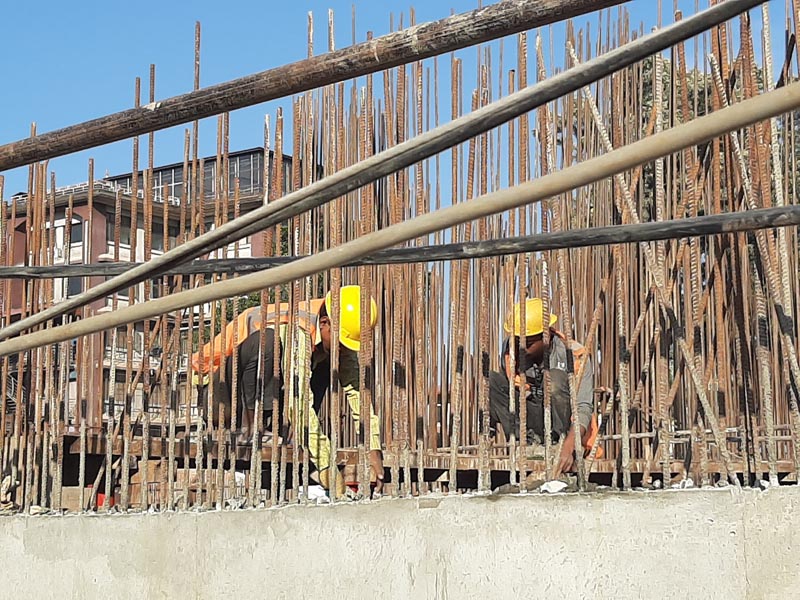Slowdown in construction activity spells bad news for economy
Demand for construction materials has fallen due to low public capital spending
Kathmandu, November 19
Shivam Cements gave an unpleasant surprise last week when it published its financial report for the first quarter of this fiscal. The unaudited balance sheet of Nepal’s only listed cement manufacturer showed 46.5 per cent slump in profit to Rs 198.7 million.
The sharp deceleration in profit was reported at a time when the construction season is at its peak.
Nepal sees sharp hike in demand for construction materials, like cement and steel, right after Dashain-Tihar-Chhath festivals. “But there is no enthusiasm this year,” said Pashupati Murarka, one of the owners of Arghakhachi Cement, which has seen “15 per cent drop in sales volume in recent months”.
“Some of the cement factories have reported up to 25 per cent drop in sales,” said the former president of the Federation of Nepalese Chambers of Commerce and Industry, adding, “Sales of steel have also tumbled in a similar fashion.”
Demand for construction materials has fallen due to low public capital spending. The central government has allocated Rs 408 billion for capital spending in this fiscal. But in the first four months of this fiscal only six per cent of that budget was used. The spending trend of provincial and local governments is no different. But what is also true is that the government’s capital spending always remains low at this time of the year, and that trend has not been bucked this year as well.
“Demand for construction materials is usually driven by the private sector and households at this time of the year. But it has not picked up this year despite fall in prices,” said Murarka.
Nepal has been seeing an uptick in demand for construction materials in the last few years, as the economy is on a higher growth trajectory. Nepal’s economic growth averaged 6.9 per cent per annum (7.3 per cent in market price) in the last three years as against sub-par growth of around four per cent per annum for almost 45 years before fiscal 2016-17.
No one believes the latest slowdown in construction activities will push Nepal back into the low-growth trap. But concerns about fall in consumption are growing because the construction sector is one of the biggest job providers.
As of now, there seems to be no imminent danger of rapid fall in consumption. Bhatbhateni Supermarket, which can be regarded as bellwether of Nepal’s consumer behaviour, reported 23 per cent jump in sales in first quarter of this fiscal over the same period last year, according to its Chief Operating Officer Panu Poudel.
Albeit, a number of apparel and electronics stores in New Road area, which is also frequented by shoppers, told THT that their sales have dropped this year. If consumption fails to grow at a desired pace due to fall in disposable income, economic growth may be hit.
Lately, worries are also festering over a slowdown in the government’s revenue collection. The Ministry of Finance was able to meet only 78 per cent of its revenue target in the first four months of the current fiscal. The revenue of Rs 257 billion collected in the four-month period was only 1.2 per cent higher than that of the same period in the last fiscal year.
“Revenue collection mainly suffered because of deceleration in imports. But it could have gone up had there been improvement in domestic production. This points to fragile consumer demand, unless people are saving more these days,” said Economist Bisow Poudel. The problem seen in revenue sector may be exacerbated by a weak profit of banks as seen in the first quarter of this fiscal. A drop in revenue collection prevents the government from pursuing development activities in a desired manner and can even widen fiscal deficit.
“All this indicates the economy is facing severe headwinds. This is because construction of most government’s projects is moving slowly, power supply for industries is not consistent, credit disbursement has fallen and new firms that can create large number of jobs have not been established,” said Poudel. Further, policies, such as those aimed at tightening reference pricing for customs clearance to increase revenue, are providing new avenues for government officials to ask for bribes, demoralising businesspersons.
What is more worrying is recent arrest of banker Ajay Shrestha and renowned industrialist Roop Jyoti, which has left many businesspeople feeling increasingly insecure. All this while, Finance Minister Yubaraj Khatiwada has been boasting of creating a “favourable business environment” at public events.
In private, a number of businesspersons said they were losing confidence in the country’s future because of bad policies and inept leadership. But they could not muster courage to say this in public because economy, which was once considered a safe topic for open discussion, has become a ‘taboo subject after Khatiwada took up the reins of the finance ministry’.






